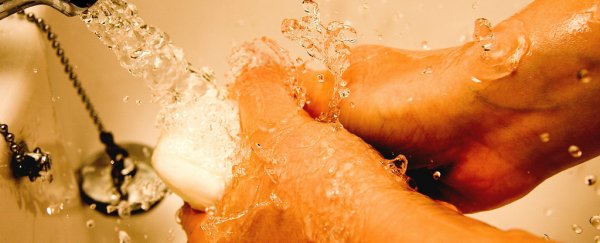Antibacterial products came into our lives to make everything more hygienic, but evidence has been mounting over the past few years that suggests they might be doing more harm than good.
Now researchers have shown that one of the most common antimicrobial ingredients, triclosan - which is found in everything from hand wash to toothpaste in the US - can rapidly mess up the gut bacteria of zebrafish.
Now, zebrafish aren't humans, so let's not blow this result out of proportion until we have some studies in mammals. But many of the strains of gut bacteria that triclosan was tested against are similar to those in our own intestines, so it's definitely something that's worth further investigation.
"There has been a legacy of concern about exposure to microbial pathogens, which has led to increased use of these antimicrobial products," said lead researcher Thomas Sharpton from Oregon State University.
"However, there's now a growing awareness of the importance of the bacteria in our gut microbiome for human health, and the overuse of antibiotics that can lead to the rise of 'superbugs'. There are consequences to constantly trying to kill the bacteria in the world around us, aspects we're just beginning to understand."
We've probably all heard by now how important maintaining the balance of our gut bacteria is to our physical and mental health. The research is still in its early phases, but already scientists have linked an out-of-whack gut ecosystem, or 'microbiome', to everything from our metabolism and weight, to cases of anxiety and depression.
So how can an antimicrobial agent mess with all of that? Triclosan is one of the most commonly used ingredients to kill off bacteria and fungus in the US, and it's used in shampoos, soaps, mouthwashes, toothpaste, and in cutting boards, toys, and kitchen utensils to keep things 'clean'.
But it's also been established that triclosan can be easily absorbed through the skin and intestines, and in tests it's showed up in everything from breast milk to urine. Slightly more worrying, studies have shown that the ingredient can also disrupt human hormones, and evidence in mice suggests it could increase the risk of liver cancer.
For that reason, Europe has heavily regulated the use of triclosan, and the state of Minnesota put a ban in place in 2014, which will take effect next year. But across the rest of the US, and in many other countries, companies simply need to list triclosan as an ingredient for it to be sold to consumers.
To see what affect that might have on a range of bacteria found in our guts, the researchers fed zebrafish a diet of triclosan-infused food for different periods of time.
They found that compared to the control group, the balance of gut bacteria strains, as well as the structure of the communities, drastically changed, even after just four days of triclosan exposure.
"Clearly there may be situations where antibacterial agents are needed," said one of the researchers, Christopher Gaulke. "However, scientists now have evidence that intestinal bacteria may have metabolic, cardiovascular, autoimmune, and neurological impacts, and concerns about overuse of these agents are valid."
"Cumulative impacts are also possible," he added. "We need to do significantly more evaluation of their effects, some of which might be dramatic and long lasting."
As we mentioned before, it's still not clear what this means for human health, and further tests are needed to figure out whether being exposed to the amounts of triclosan in common household products can have any affect on our own gut bacteria.
But the continuation of this work is important, because if there's one thing that's now becoming clear, it's that our gut bacteria has its proverbial fingers in a whole lot of important pies around the body, and that's not something we want to mess with.
The research has been published in PLOS ONE.
